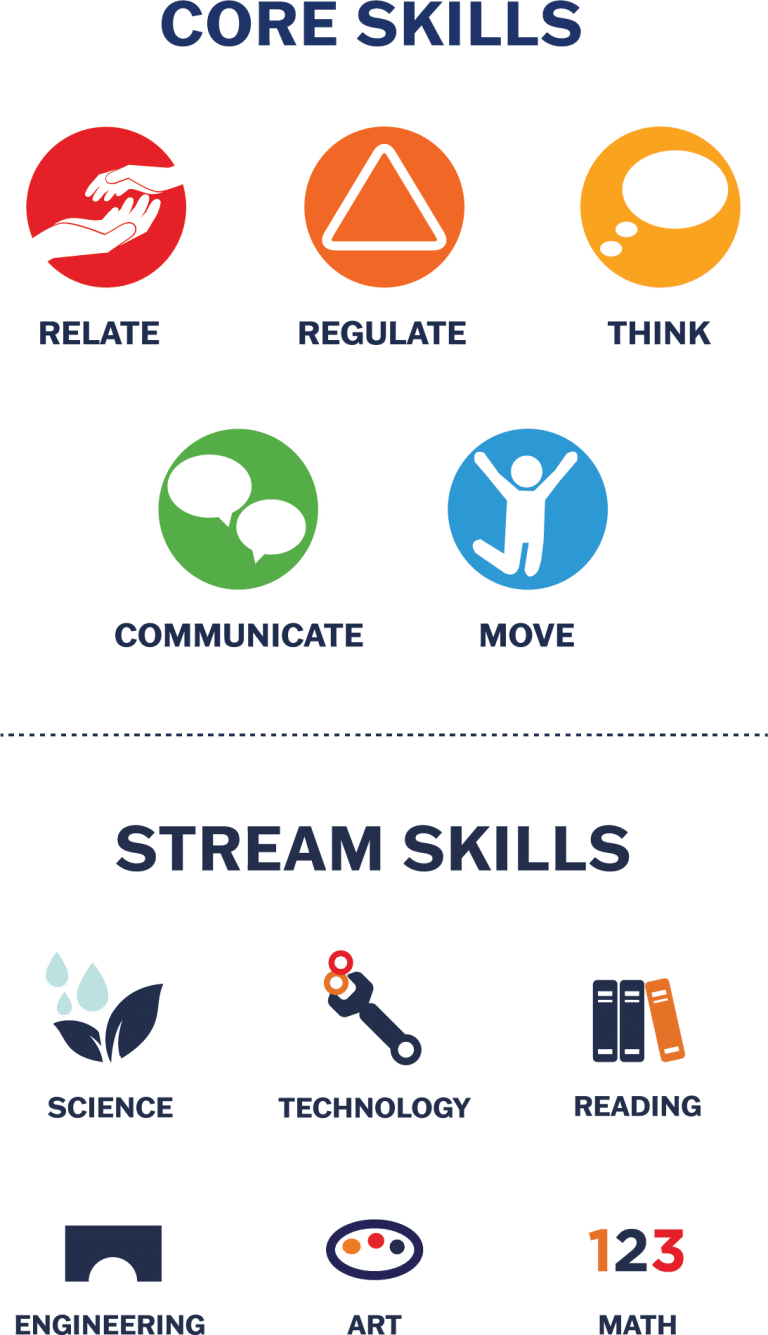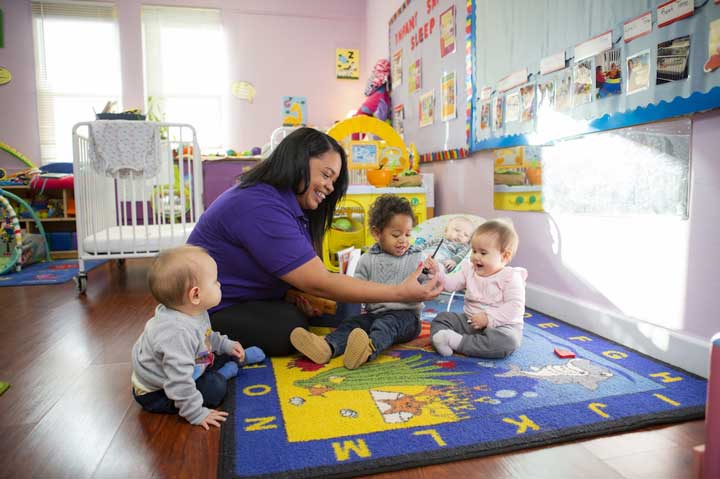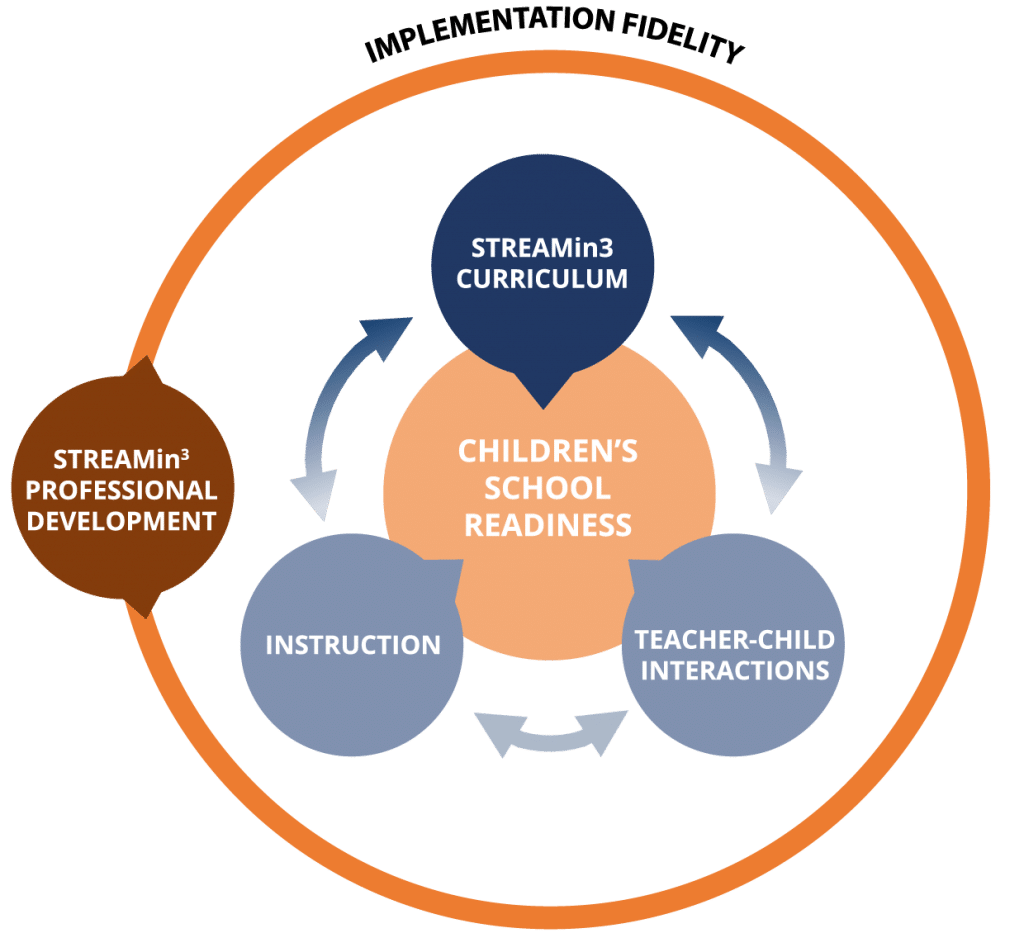The Science Behind STREAMin³
Our curriculum model doesn’t just focus on what children are learning, but how they are learning it, and how we can best support educators in their implementation.
A curriculum that sparks children’s learning with engaging activities is important. But, research also shows that it is high-quality interactions children have with their teacher and peers throughout the day at school that matter most. Simply put, what we teach children in the early years is important, but how we teach it makes a critical difference in the way children learn. That’s where STREAMin³ comes in.
A Focus on What Children Learn
STREAMin³ focuses on five Core Skills that form the building blocks for later learning and six STREAM Skills that prepare children for academic success in kindergarten and beyond. All of these skills map directly onto the developmental sequences and expectations that support early learning for infants, toddlers, and preschoolers.
A Focus on How Children Learn
STREAMin³ also focuses on what research tells us is critical for children’s learning. Young children are curious learners who need culturally relevant opportunities to learn about the world around them. And, they don’t follow the same pace and rate in their skill development, nor do they have the same interests, cultural backgrounds or experiences. STREAMin³ is structured to embrace all of these differences and meet these needs. It encourages children to be active agents in their own learning and lets teacher individualize learning opportunities as needed.
A Focus on Implementation
STREAMin³ places an emphasis on creating a comprehensive, integrated learning experience that encourages teachers to be intentional in promoting positive interactions with and between children.


A FOCUS ON IMPLEMENTATION
The in³ of STREAMin³
Integrated
We integrate academic and social-emotional skills in a way that leads to authentic, powerful learning experiences. Our curriculum spans across birth to five, providing a trajectory of learning.
Intentional
Our curriculum is designed so that teachers know why they are doing what they are doing in any given moment. This intentionality means that effective support is provided throughout the entire day, not just during formal activities.
Interactions
A child’s interactions between teachers and peers are what matter most. We focus on the importance of interactions during planned activities, as well as the moment-to-moment interactions that happen across the day.
Supporting Implementation
At STREAMin³, we know educators need training and ongoing support to implement a curriculum with high fidelity.
Our curriculum model includes professional development (PD) to help teachers maximize their moment-to-moment interactions with children, the instruction they provide, and their implementation of the STREAMin³ curriculum.
Embedded materials and resources, individualized coaching, and group PD sessions all help programs reflect on how to get the most out of the STREAMin³ curriculum within their early childhood education center program.

There are so many facets to STREAMin³ that make it so successful for our children. The emphasis on social and emotional competencies not only helps current students to regulate their feelings and behaviors, but it also allows for teachers to maximize their instructional time.
— Early Childhood Program Administrator
Our Theoretical Framework
Central to any curriculum package is a focus on what children learn and how they learn it. Take a closer look at the theory behind STREAMin³.
STREAMin³ Research Pilot
Our curriculum was piloted as part of a research study in over 100 private, faith-based, and public classrooms across 37 early childhood programs in Virginia.
Ongoing Research to Assess Impact
In 2022, Virginia Commonwealth University (VCU) conducted an independent evaluation of the STREAMin³ curriculum during the first year of its statewide availability. A team at VCU led by Dr. Kevin Sutherland, Dr. Bryce D. McLeod and others evaluated the implementation and effectiveness of the STREAMin³ curriculum model.
The University of Virginia received funding from the Institute of Education Sciences (IES) to conduct an efficacy trial starting in the fall of 2024. This study will examine the initial impact of the STREAMin³ curriculum model in private programs, exploring whether and how STREAMin³ supports teachers’ instructional practices and children’s school readiness skills. The data collected will be used to continuously improve the model. Interested in learning more? Head to our STREAMin3 Impact Project page.
